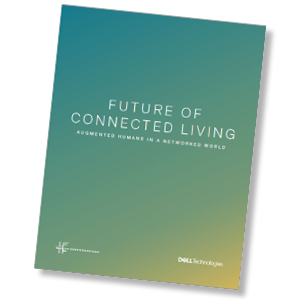Realizing 2030 The Future of Connected Living

EMERGING TECHNOLOGIES SHAPING OUR LIVES IN 2030
Institute for the Future and Dell Technologies released The Future of Connected Living - new research exploring how emerging technologies will transform how we live by the year 2030. The research, conducted in partnership with Institute for the Future (IFTF) and Vanson Bourne, surveyed 4600 business leaders across 40+ countries.
Emerging technology driving major shifts
IFTF and a forum of global experts forecast that technologies such as edge computing, 5G, AI, Extended Reality (XR) and IoT will combine to create five major “shifts” in the coming decade. These shifts will have the power to change lives across the globe.
IFTF forecasts the following shifts
between now and 2030:
Networked Reality
Over the next decade cyberspace will become an overlay on top of our existing reality as our digital environment extends beyond televisions, smartphones and other displays.
Connected Mobility and Networked Matter
The vehicles of tomorrow will essentially be mobile computers. We will trust them to take us where we need to go in the physical world as we interact in the virtual spaces available to us wherever we are.
From Digital Cities to Sentient Cities
Cities will quite literally come to life through their own networked infrastructure of smart objects, self-reporting systems and AI-powered analytics.
Agents and Algorithms
We will each be supported by a highly personalized “operating system for living” that is able to anticipate our needs and proactively support our day-to-day activities to free up time.
Robot with Social Lives
Robots will become our partners – enhancing our skills and extending our abilities. Robots will share newfound knowledge to their social robot network to crowdsource innovations and accelerate progress, in real time.
Navigating Challenges
These major technology-led shifts may challenge people and organizations that are grappling with change, according to the research. Organizations that wish to harness the power of the new emerging technologies will need to take steps to effectively collect, process and deploy data to keep pace with rate of rapid innovation.
Additionally, concerns around the fairness of algorithms that do everything from decide how companies hire to who is eligible for loans must be addressed, as will growing concerns from the public about data privacy. Governments will need to learn how to work together to share and deploy their data if cities are to go from digital to sentient.
To execute the research, IFTF relied on its decades-long study on the future of work and technology, the latest Dell Technologies research, and experts from across the globe. The Future of Connected Living is the third and final part in a three-part research series that includes The Future of the Economy and The Future of Work, both of which were released earlier in 2019.
For more information
Please contact David Pescovitz | dpescovitz@iftf.org
For more on the breadth of IFTF's work in automation, jobs, and wealth inequality
Visit the Equitable Futures Lab or contact research director, Anmol Chaddha | achaddha@iftf.org.




